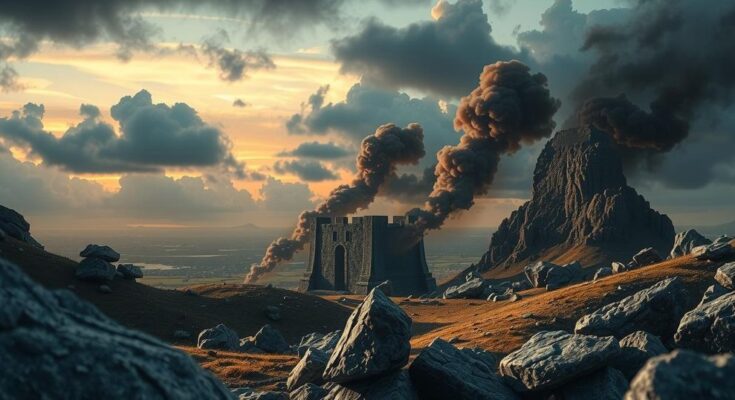The M23 rebels have advanced southward in DR Congo, capturing Goma and threatening Bukavu. Despite international criticism and calls for intervention, Rwanda defends its involvement, complicating the situation. The humanitarian crisis is worsening, with increased casualties, population displacement, and shortages of essential resources. Regional leaders are convening to address the emerging threats amid escalating tensions.
The armed group M23, allegedly supported by Rwanda, has advanced southward, threatening a strategic military airport in the Democratic Republic of Congo (DRC). The escalation follows the group’s recent takeover of Goma, the capital of North Kivu province, amidst increasing concerns from the international community. As tensions mount, the Southern African Development Community convenes an emergency summit to discuss the situation.
Local sources indicate that M23 fighters are now engaging near Kavumu, where Congolese forces have established a defensive line just north of Bukavu. The urgency of the situation is underscored by warnings from the United Nations regarding M23’s rapid approach toward Bukavu, a city crucial to the region’s stability. President Felix Tshisekedi has pledged a vigorous military response to the M23 advances.
Reports suggest the Congolese army is facing limited resistance against well-equipped M23 troops, prompting fears of severe humanitarian impacts. In Goma, civilian casualties are mounting, with hospitals overwhelmed and residents expressing their desire to resist M23’s control. The global community, including the United Nations and various nations, has urged Rwanda to withdraw its support of M23.
In response to the growing criticism, Rwandan government representatives have defended their actions, denying support for M23 and attributing the conflict’s complexities to larger geopolitical factors. Meanwhile, the extraordinary summit in Harare will not include the leaders of Rwanda or Angola, highlighting the diplomatic challenge posed by the crisis. Increased tensions among regional leaders, particularly following military losses, further complicate the situation.
M23’s occupation of Goma has exacerbated an existing humanitarian crisis, prompting significant population displacement and contributing to shortages of food and water. The ongoing conflict has raised alarms regarding potential health crises, particularly within disease-prone regions. Amidst accusations of exploiting the region’s mineral resources, Rwanda continues to assert its commitment to addressing security concerns related to historical conflicts.
The conflict between the M23 rebel group and the Congolese government is rooted in decades of instability within the DRC. Following the Rwandan Genocide in 1994, many Hutu militants and refugees fled to Congo, leading to ongoing tensions and conflict among various armed groups. The M23 group claims to represent interests within the Congo, while Rwanda’s involvement raises concerns about external influence and resource exploitation in the mineral-rich region. The crisis has attracted international scrutiny, prompting various nations and organizations to engage diplomatically and seek resolutions.
The M23 rebels’ advances represent a significant escalation in the ongoing conflict in the DRC, with potential risks to regional stability and humanitarian conditions. With local and international calls for intervention, the situation remains precarious, requiring urgent attention from regional leaders and global stakeholders. The complexity of the conflict, exacerbated by foreign influence and local grievances, underscores the need for comprehensive solutions to address the root causes of instability and humanitarian needs.
Original Source: www.rfi.fr




